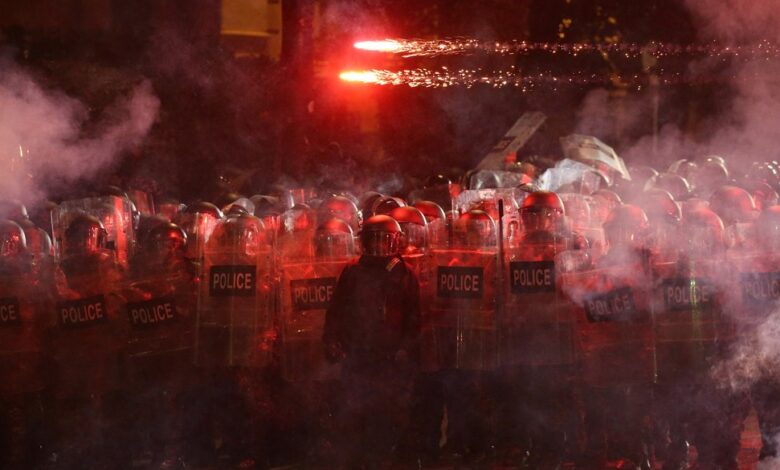Protests in Georgia: police dispersed demonstrators in Tbilisi with the use of special equipment

Clashes between protesters and the police continue for the third night in a row in Tbilisi. On the night of December 1, large-scale protests, caused by the authorities’ decision to abandon European integration, resumed in the Georgian capital. Police and special forces use water cannons and pepper spray to disperse demonstrators who oppose the pro-Russian course of the Georgian Dream party.
As writes “Echo Kavkaza”, thousands of people gathered on Rustaveli Avenue near the parliament, expressing outrage over the decision of the Georgian government to temporarily suspend negotiations on joining the European Union. The Ministry of Internal Affairs of Georgia noted that the protest went far beyond the limits established by the law on assemblies and demonstrations and turned into a completely violent one.
According to local media reports, clashes between demonstrators and law enforcement began after protesters set up barricades and started using fireworks in response to police actions. Security forces quickly removed obstacles and dispersed people from the central square to other areas of the city.
Media also reported that some protesters were forced to break shop windows to take cover from tear gas. The exact number of victims is still unknown, but they include both demonstrators and security forces.
The wave of protests in Georgia began on November 28 after Prime Minister Irakli Kobakhidze announced the postponement of negotiations with the European Union until 2028. According to him, the country needs time for economic preparation to start official negotiations in 2030.
This decision caused sharp criticism from the opposition and society. Tensions increased after the European Council expressed concern over the actions of the Georgian government, in particular the adoption of laws limiting the rights of the LGBT community and the draft law on “foreign agents”. Additionally, the EU did not recognize the results of the parliamentary elections held in Georgia in October.
The first clashes took place on November 28, when dozens of people, including journalists and police officers, were injured. Then the police detained 43 participants of the protest. Later, during a new wave of protests on the night of November 29-30, the number of detainees increased to 107 people.
The Georgian government’s decision to suspend European integration and crack down on protesters could further worsen the country’s relations with the European Union, as well as draw condemnation from the international community.





